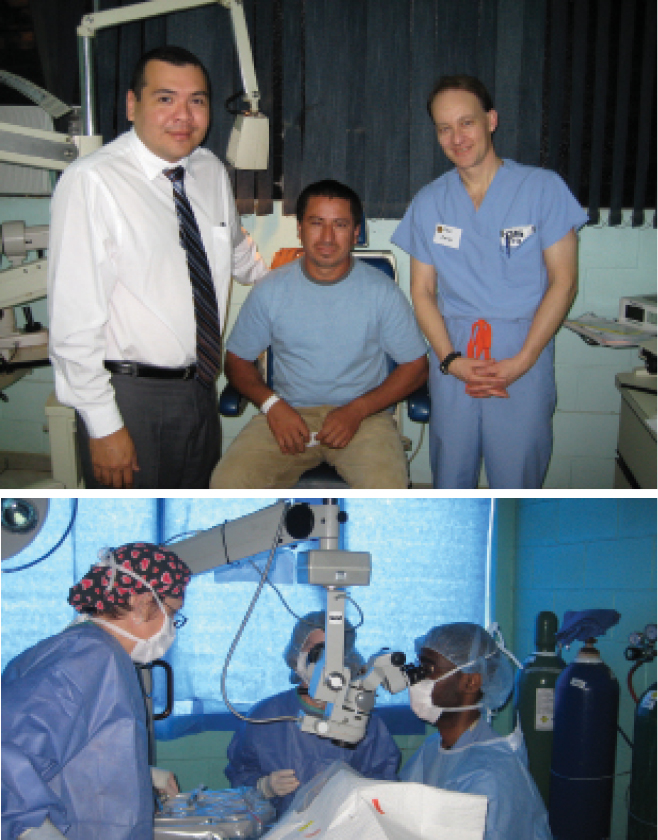Global Outreach in the Era of COVID-19
Organizations adopt new ways of reaching underserved populations during the pandemic.
With most international travel cancelled this year due to COVID-19, many medical missions have been unable to proceed as planned. Some organizations, however, are taking the opportunity to evaluate and improve their practices in order to better provide global ophthalmic care in this new reality. This article is part two of a series exploring the different ways that global ophthalmology has been affected by the COVID-19 pandemic and how those involved with international medical missions are adapting their efforts during this unprecedented time.
In January 2020, I had just taken part in a wonderful and productive North American Eye Campaign, an annual 9-day mission trip to El Salvador focused on bringing comprehensive eye care to underserved areas. This year’s mission was perhaps our most successful yet, but just 1 month after our return, the world as we knew it changed completely.
Our group is a close partner of the Salvadoran Association for Rural Health (ASAPROSAR) and is a 501c3 organization called the Friends of ASAPROSAR (FOA). We complete one big mission each year, which is unique in that it combines a busy surgical campaign with an even busier clinical campaign. Unlike many other ophthalmic missions, a high volume of clinical examinations, refractions, and eyeglass dispensing occurs while the ORs are in full swing (Figure).

Figure | During the annual ASAPROSAR campaign, a high volume of clinical examinations, refractions, and eyeglass dispensing occurs while the ORs are in full swing. Pictured here (top), from left to right, Salvadoran ophthalmologist Gerardo Lopez, MD, is with a Salvadoran patient and Paul R. Cotran, MD, Medical Director of Friends of ASAPROSAR.
By spring of this year, it became increasingly clear that it would be impossible to run a mission in January of 2021. Like many other volunteer groups, we were forced to cancel our plans due to COVID-19. We realized that we would not be able to guarantee the safety of our volunteers or patients. Until we have a vaccine or treatment or a very reliable way of testing everyone who comes on the mission, we cannot execute it safely.
a chance to pause and reset
As the vice president of FOA reminded us during a sobering video conference call following the cancellation of our 2021 campaign, this year we can donate an equal amount of time to the organization as we would have to preparing and conducting our 2021 mission. The annual campaign consumes so much of our energy for months before departure that we often return with mission fatigue, and momentum needed for program improvement projects can be lost. During this pandemic-forced pause, we have successfully pursued an initiative to purchase a cloud-based inventory system called Boxstorm for tracking and ordering OR and clinic supplies. Additionally, we are now using Eleo, a database application to connect with our donors and improve our fundraising as well as Managed Missions, a nonprofit that provides us with low-cost software and services designed for medical outreach projects, including volunteer application forms and waivers. In addition, FOA’s website has been entirely redesigned (friendsofasaprosar.org ). Together, these efforts enhance our efficiency, promise to make future missions better, and may even allow us to expand our capacity for outreach.
SUPPORTING our partners FROM AFAR
Given these unprecedented circumstances, we have looked for other ways to support our colleagues in El Salvador. FOA is focusing primarily on fundraising to help alleviate the financial stress that ASAPROSAR, like many nonprofits, is experiencing during this health crisis. As we are unable to send donated glaucoma medications to Santa Ana this winter, we have provided the funds for these drugs to be purchased locally for clients who cannot afford them. We are also available for remote consultation on difficult cases and have shared information on how to reduce the risk of COVID-19 infection in the clinic and OR based on our early experience with the pandemic in the Boston area.
Our goal is to support our partners so that they can survive this year and provide the best possible eye care to the communities they serve, just as we are trying to do in North America. We want to ensure that both of our nonprofit groups are in good financial shape so that we can continue our long-term collaboration after this period of crisis ends.
Friends of ASAPROSAR: A Longtime Partnership Providing Comprehensive Eye Care
The Salvadoran Association for Rural Health (ASAPROSAR) is a nongovernmental organization devoted to improving the health of the poor in rural El Salvador. ASAPROSAR evolved from the work of a general practitioner, Vicki Guzman, MD, who, in the late 1970s, began treating the rural poor in her home country of El Salvador. Eventually, Dr. Guzman’s efforts attracted the attention and support of Americans from the Boston area, who founded the Friends of ASAPROSAR (FOA).
ASAPROSAR has remained a major provider of ophthalmic and optometric services in El Salvador and, over time, has expanded to include three ORs, which are used year-round by local ophthalmologists who are employed by ASAPROSAR as part-time consultants.
An important component of this 30-year partnership is the North American visiting mission, which provides an opportunity to deliver 1 week of high-quality, comprehensive surgical and clinical care to a large number of Salvadorans. The FOA team includes around 60 volunteer ophthalmologists, anesthesiologists, optometrists, nurses, and technicians as well as others who serve as translators, eyeglass dispensers, and administrators. For the week of the campaign, ASAPROSAR’s staff works with the visiting group with a shared objective of helping as many people as possible.
Editor’s note: More information about the history and work of FOA can be found here.
what about the people we serve?
A full year or more of COVID-19’s putting the brakes on medical missions is certain to have residual effects. For FOA, it is clear that many of the patients who depend on us for eye surgery, diagnostic consultations, and eyeglasses will be delayed in receiving that care. For some patients, particularly those with bilateral cataracts or cataracts complicated by glaucoma or diabetic retinopathy, a 1-year delay in treatment will be critical and, in some cases, will result in blindness.
We feel terrible about our inability to provide the care on which the people of El Salvador have come to rely. Meanwhile, our partners there continue to run an eye care program and OR, but they are doing so with caution. As in the American health care system, all are wearing masks and practicing social distancing. In addition, the people of El Salvador have almost universally cooperated with public health recommendations to reduce the spread of the virus, and the number of deaths from COVID-19 is about one-fourth that of Massachusetts’, a state with a similar population. The pandemic has severely affected ASAPROSAR’s operations and finances, but they have been able to resume seeing patients and performing a modest number of surgeries per week. However, bringing in 2,000 patients over the course of a full week, as is done during the North American Eye Campaign, would be impossible. But what to do about the backlog of more than 100 urgent cataract patients, many from remote, impoverished parts of El Salvador, that, under normal circumstances, would have been routed to us for free surgery in January?
our salvadoran partners step up
To their great credit, the directors of ASAPROSAR and their part-time ophthalmologists, led by Sidney Somoza, MD, and Gerardo Lopez, MD, have recently proposed a plan to operate on the most resource-poor patients using entirely Salvadoran professional staff. They will run a pair of 1-week surgery-only campaigns in March and July 2021, performing manual small-incision cataract surgery, with about 50 patients scheduled for each week. The ORs in the ASAPROSAR facility have proven to be adaptable to safety protocols, and so far no COVID-19 outbreaks have occurred. FOA has agreed to subsidize this special program, with the total cost expected to be around $30,000. Without American volunteers, labor expenses will be higher for this emergency mission, but the anticipated cost of performing these surgeries is still low by Salvadoran standards and extremely low by US standards.
The success of this emergency plan is still far from assured, yet the ability to engage local eye doctors, who face no travel restrictions, to perform the most essential part of our cancelled mission is nothing short of wonderful. The goal of any international volunteer eye care program should be to eventually become “unnecessary,” as local governmental and private institutions develop the capacity to provide quality eye care to their citizens. Although many obstacles to this goal exist (and vary from country to country), El Salvador is fortunate to have many well-trained cataract surgeons. But, with inadequate financial resources for the public health care system, they cannot keep up with the need for eye surgery. By providing salary support for Salvadoran OR teams and paying for the supplies needed for cataract surgery, we can help them to safely take care of their own during the COVID-19 pandemic.
long-term concerns
The pandemic will be subdued and controlled by universal vaccination, but its effects may last a long time. A major concern is that some of the nonprofits that perform this work may not reemerge after the pandemic due to a loss of volunteers and/or financial stability. Some volunteers may be reluctant to travel abroad, some organizations may not be able to financially survive the pandemic, and, in some cases, the quality of their partnerships with providers and organizations in other countries may weaken.
In the United States, we are counting on being able to receive a vaccine as soon as it is available. But the availability of a vaccine in the developing countries where we do most of our work is likely to be slower and more difficult to achieve. Whereas many of us expect to roll up our sleeves for a vaccine in the coming months, the wait may be several months longer for those in places such as the Democratic Republic of the Congo or El Salvador. FOA will not be able to resume our normal eye campaign until 2022, and worries about future outbreaks of COVID-19—not to mention Dengue, Chikungunya, and Zika—may complicate future plans for the North American team.
conclusion
Although the pandemic has been a challenge, we believe that we will emerge as a stronger and more efficient organization. It is very encouraging that our Salvadoran partners and ophthalmologist colleagues are stepping up to fill the gap in surgical care created by our mission’s cancellation. With more financial resources expected due to enhanced fundraising, FOA will be able to support ASAPROSAR by increasing their ability to recruit Salvadoran staff to deliver care to ASAPROSAR’s most economically disadvantaged clients throughout the year and eventually allowing them to become less reliant on our annual North American campaign. As much as we love spending time with our colleagues and patients in El Salvador, the true measure of success of any mission is to ultimately no longer be needed.



